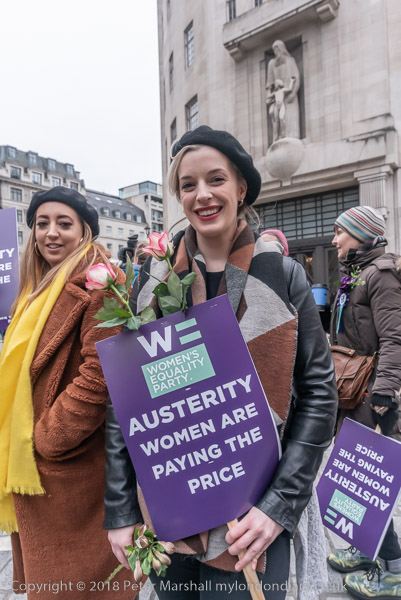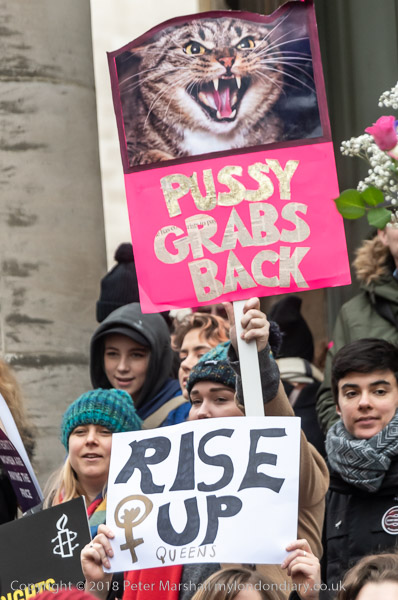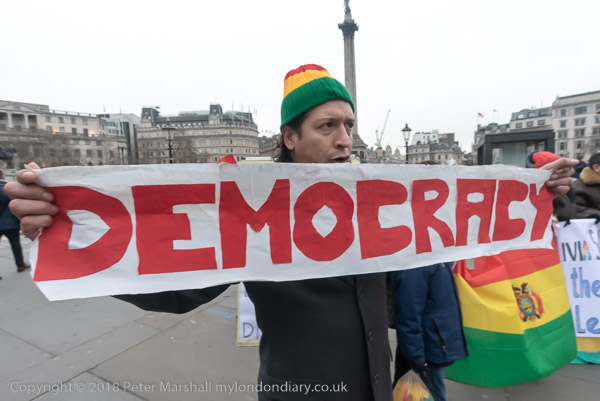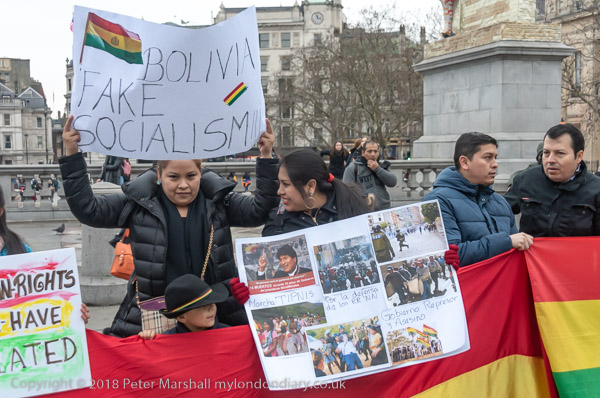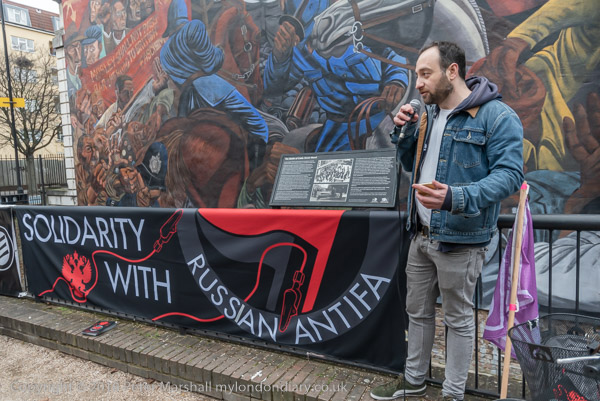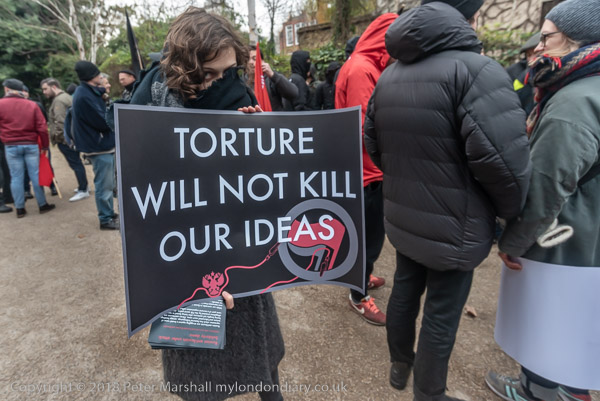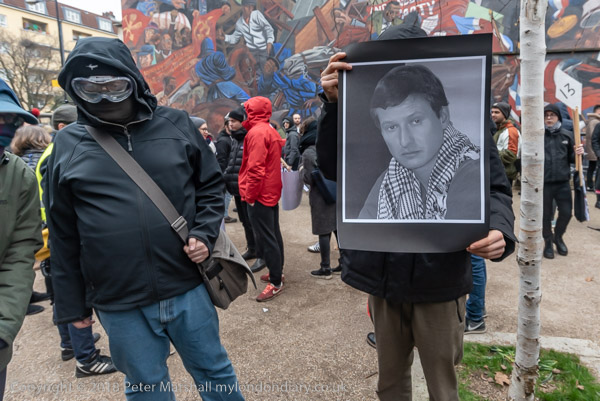Bread & Roses, Morales & Russian anti-fascists: Three events I photographed on Saturday 19th January 2019.
Bread & Roses is again relevant now in January 2024, with the release of a new version of the song a few days ago by the ‘Orchestra of Cardboard‘, part of the amazing ‘Every street a POWER STATION campaign‘, a project of Walthamstow’s community interest company Optimistic Foundation CIC set up by artist and filmmaker Hilary Powell and filmmaker and musician Dan Edelstyn. The recording is a part of their fundraising campaign and your can read, see and hear more about it and their other campaigns which are already having an effect in the area on their crowdfunder page.
But back to January 2019, five years ago today.
Women’s Bread & Roses protest
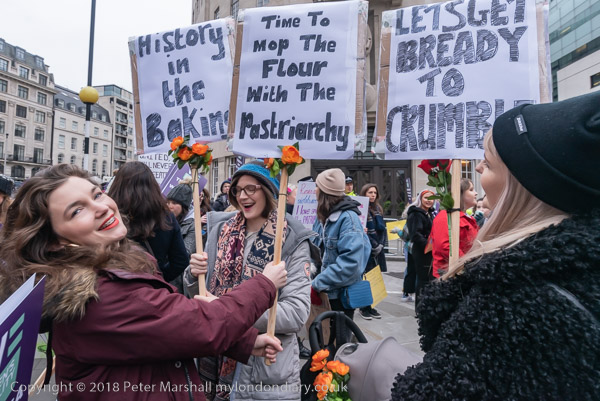
Inspired by the Bread & Roses protests which revolutionised workers’ rights for women in 1912, Women’s March London marched from the BBC to a rally in Trafalgar Square against economic oppression, violence against women, gender pay gap, racism, fascism, institutional sexual harassment and hostile environment in the UK, and called for a government dedicated to equality and working for all of us rather than the few.
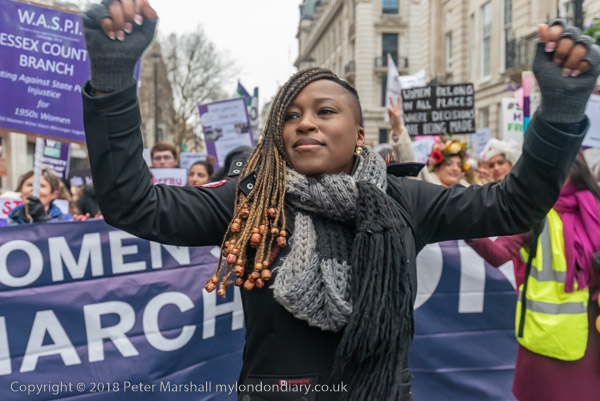
The London march was part of an international day with women marching in many countries around the world, particularly in cities across the USA.
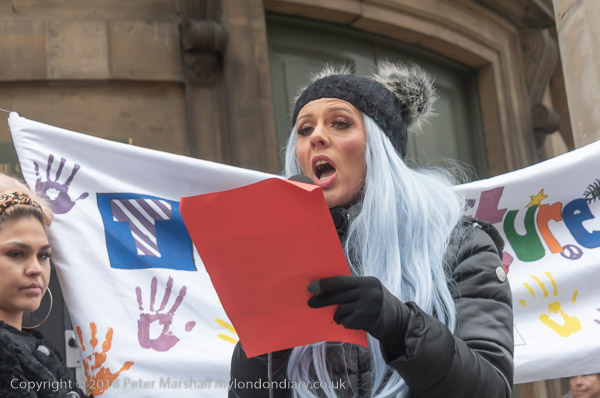
At the start of the march was opposite the BBC on the steps of Langham Place a few of the women organising the event were being directed and filmed by a BBC film crew. Supposedly this was a documentary but it seemed to be more a scripted drama closely controlled by the director and with the women involved holding orange folders from which they read.
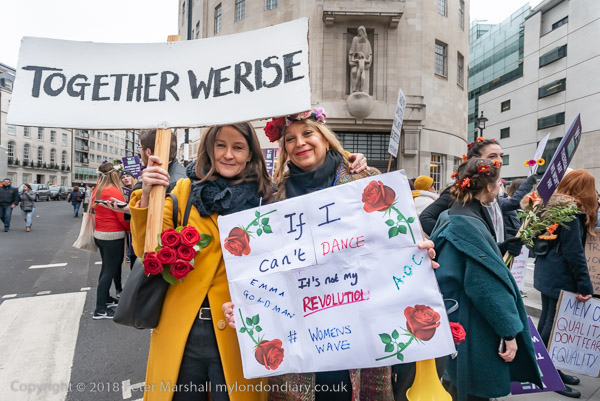
But there were a rather larger group of women (and just a few men with them) standing around outside the BBC building and largely ignoring the filming that was taking place. Many had made placards especially for the event, with some using words from the poem ‘Bread and Roses‘ written by James Oppenheim and published at the end of 1911. The phrase ‘Bread and Roses’ came from a speech the previous year by Helen Todd, speaking about the need for laws to regulate wages, working hours and conditions.
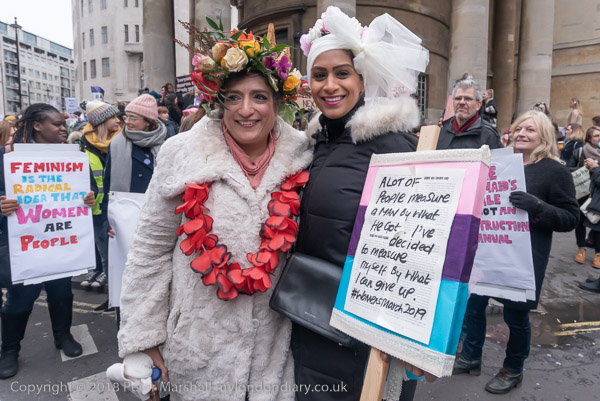
A few days later a strike was started by textile workers, largely immigrants, in Lawrence, Massachusetts. The strike was organised by the IWW, the Industrial Workers of the World, led largely by women and they took up Oppenheims poem and sang it at their meetings and marches, as well as apparently marching with a banner ‘We want Bread, and Roses too!’ during their three-month strike.
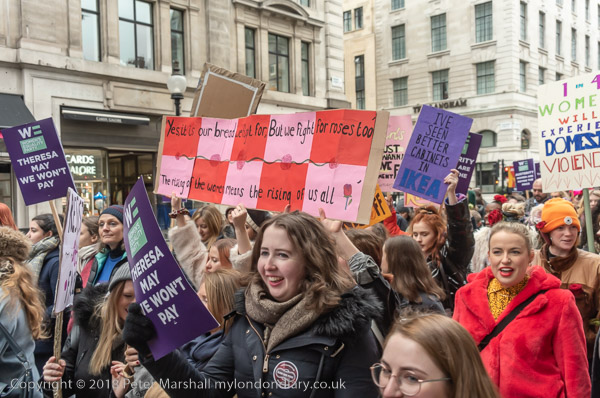
Eventually, when the BBC had finished making their movie the women gathered for a march and I walked with them to Trafalgar Square.
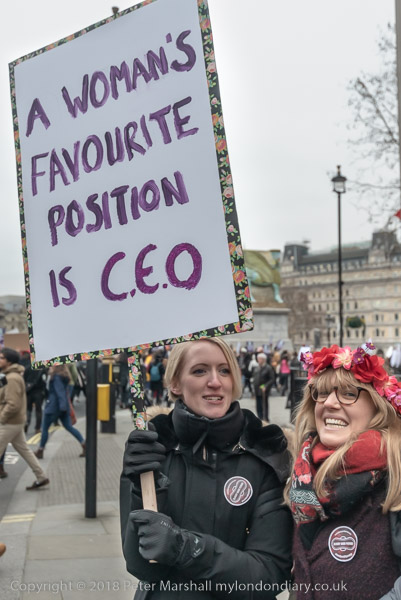
Many more pictures on My London Diary at Women’s Bread & Roses protest.
Bolivians protest against Morales – Trafalgar Square
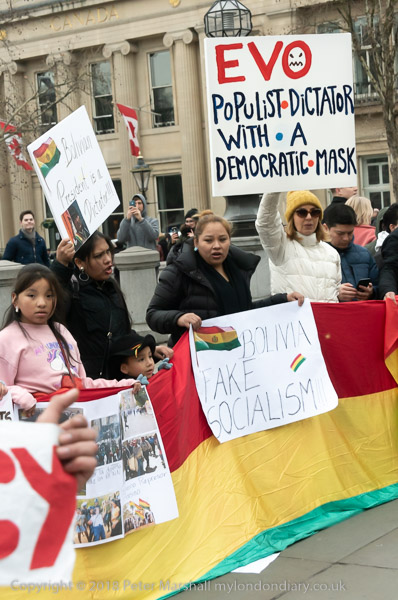
A small group of Bolivians had come to protest following a decision in December by the Electoral Commission that President Evo Morales could stand for a fourth term in office in the October 2019 elections which were starting with primaries at the end of January 2019. But I was not convinced that this was truly a protest about democracy rather than simply against his socialist policies.

Morales, Bolivia’s first president to come from the indigenous population was first elected in 2005. He supported the 2009 constitution which allowed only two consecutive terms in office but was able to stand for a third term as his first term had been before the limit was imposed. In 2016 tried to increase the limit to three terms by a referendum which was narrowly defeated. But after this the courts ruled that the limitation infringed the human rights of citizens, allowing him to stand for a further term.
Morales won the October 2019 but their were widespread protests alleging electoral fraud, although later investigations suggested he had indeed gained the 10% lead required for a first-round victory. But the protests grew and he was endangered by armed groups; eventually he resigned on 10th November 2019, fleeing to Mexico where he was granted political asylum. Allegations made against him of sedition and terrorism were later found to be politically motivated and in 2020 a Bolivian court found his rights had been violated and judicial procedures breached.
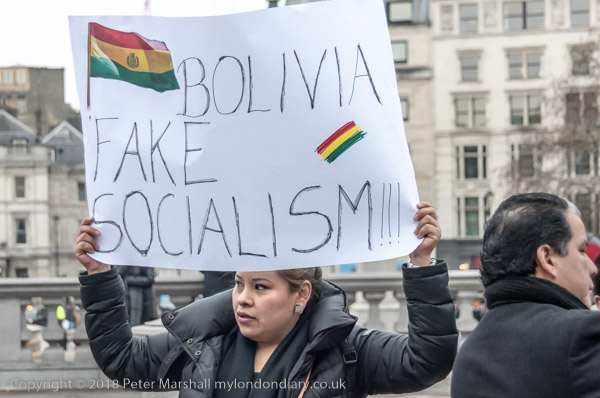
His successful policies which reduced poverty and illiteracy and combated the influence of the USA and multinational companies made him very unpopular among the middle class and particularly the groups accustomed to running the country. Many in the USA encouraged and financed the opposition to him as he was widely seen to have shown a successful alternative to the growth of international capitalism.
Bolivians protest against Morales
Solidarity with Russian anti-fascists – Whitechapel
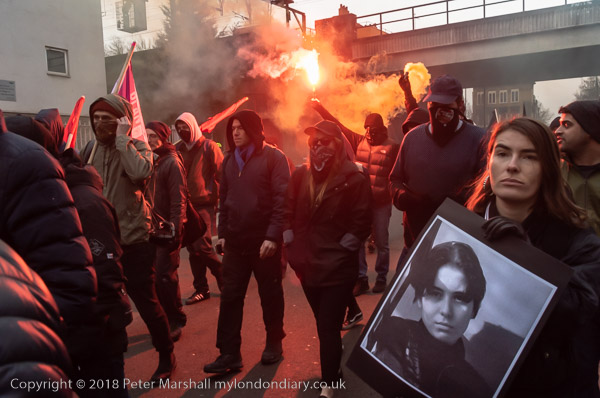
Finally I went east to the Cable Street Mural where anarchists and anti-fascists were meeting l to oppose racism, xenophobia, fascism and the upsurge of far-right populism and to show solidarity with Russian anti-fascists who have been arrested, framed and tortured in a brutal wave of repression.
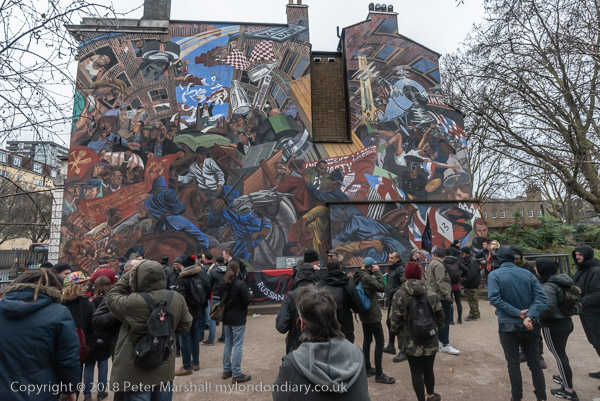
Russian and Ukranian comrades spoke at the rally. telling us of the persecution taking place. The Russian Federal Security Service (FSB) arrested six in Penza in 2017, charging them with belonging to a non-existent organisation, ‘The Network’. Beatings and torture before their trial were used to make them give false confessions.
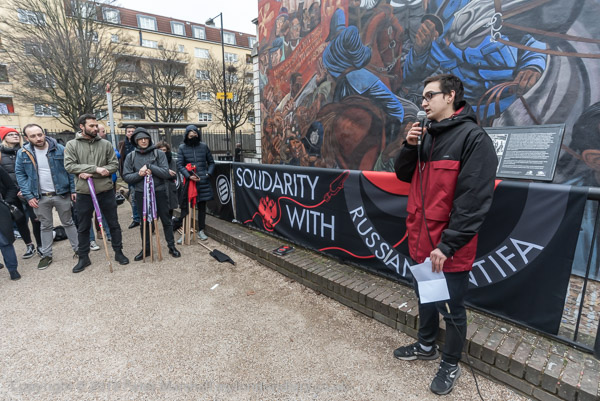
Two others were arrested in 2018 in St Petersburg and charged with belonging to the same fictional network and again tortured into making confessions and further similar arrests have followed. A total of 11 where then in prison for belonging to’The Network’, facing 5 to 25 years in jail.
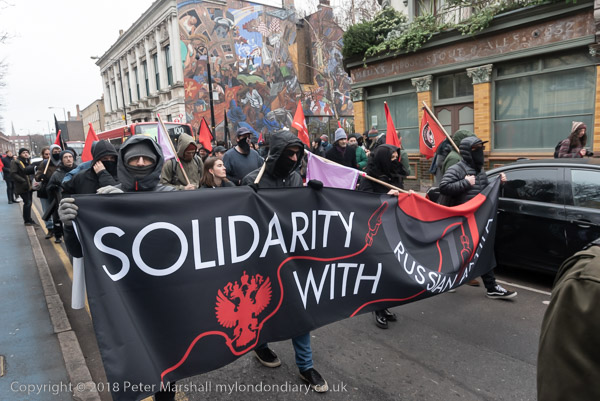
The date for the protest was chosen as the anniversary of the brutal murder of two Russian anti-fascists, journalist Anastasia Baburova and lawyer Stanislav Markelov, by fascists in broad daylight on the streets of Moscow on January 19th 2009. Russian anarchists and anti-fascists hold events to remember them on this day every year.
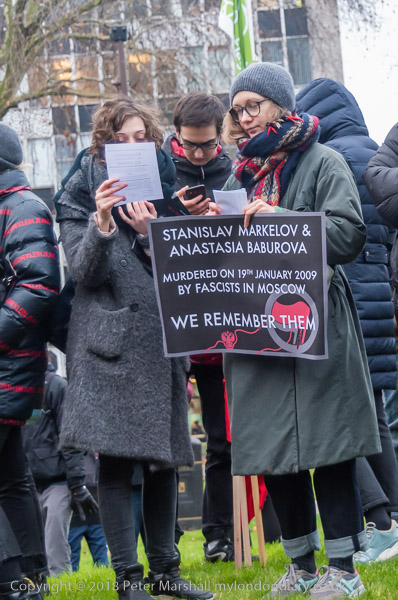
There was then a march to a further rally in Altab Ali Park, named for the 24-year-old clothing worker murdered in a nearby street on 4 May 1978.
More pictures at Solidarity with Russian anti-fascists.
Flickr – Facebook – My London Diary – Hull Photos – Lea Valley – Paris
London’s Industrial Heritage – London Photos
All photographs on this page are copyright © Peter Marshall.
Contact me to buy prints or licence to reproduce.
